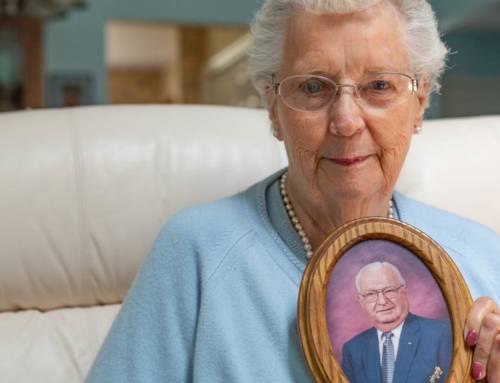
About the Author: Sunday Sermons from Sell Chapel are written by Rev. Preston Van Deursen, Director of Pastoral Care at the Masonic Village at Elizabethtown.
Have you ever noticed that no matter what you do, you can’t please everybody? Somebody, somewhere is going to criticize your best efforts.
I have been prone to say you can’t please anybody
As I was in D.C. this past week and visited Arlington Cemetery, I have to use Former president John F. Kennedy story he once told about a legendary baseball player who always played flawlessly. He consistently hit and was never thrown out at first base. When on base he never failed to score. He never dropped a ball and threw with unerring accuracy. He ran quickly and played perfectly. Actually, he would have been one of the all-time greats except for one problem. No one could persuade him to throw away his snack and come out of the press box to play!
Legendary jazz musician Cab Calloway who is no longer with us but People who knew him describe him as a man of dignity and humor. One night at Birdland, the legendary jazz bar, Cab was introducing a promising young saxophone player. As the sax player finished his set, a self-appointed jazz critic came over to him and said, in front of Cab, “You aren’t that good, man. All you can do is play like Charlie Parker.”
Cab took the young man’s sax and handed it over to the critic. “Here,” he said, “you play it like Charlie Parker.”
Isn’t it true that whenever you are trying to do something significant, somebody comes around to criticize?
Anybody know someone like that? They won’t try to do something significant themselves, but they sure can criticize those who do.
I like to call them busy bodies, they don’t know what to do with themselves except sit around and criticize everybody else.
Any body know anyone like that?
Jesus encountered people like that. He was teaching in one of the synagogues on the Sabbath. A woman was in the synagogue with a spirit that had crippled her for eighteen years. She was bent over and was quite unable to stand up straight.
When Jesus saw her, he called her over and said, “Woman, you are set free from your ailment.” When he laid his hands on her, immediately she stood up straight and began praising God. But the leader of the synagogue, indignant because Jesus had cured on the Sabbath, kept saying to the crowd, “There are six days on which work ought to be done; come on those days and be cured, and not on the Sabbath day.” The Lord answered him and said, “You hypocrites! Does not each of you on the Sabbath untie his ox or his donkey from the manger, and lead it away to give it water? And ought not this woman, a daughter of Abraham whom Satan bound for eighteen long years, be set free from this bondage on the Sabbath day?”
When he said this, all his opponents were put to shame; and the entire crowd was rejoicing at all the wonderful things that he was doing.
That’s amazing, isn’t it? Not the miracle but the reaction to the miracle. Jesus healed a poor little lady who was all bent over. Helped her stand straight and tall for the first time in eighteen years. And the leader of the synagogue criticized him for it.
First of all, we shouldn’t be surprised that this criticism was voiced by the leader of the synagogue. Now don’t misunderstand me. He could have been anyone in church as easily as he was the leader of the synagogue.
Religious affiliation is not a factor here.
It can happen between friends. It can happen in families. And, of course, it happens in church. People get envious. And then they become critical. And, if that doesn’t satisfy them, then crucifixion is the next logical step. We shouldn’t be surprised that this criticism was voiced by the leader of the synagogue.
And we shouldn’t be surprised that he chose religious grounds for making his attack. People are strange. They will hate in the name of love, kill in the name of peace and demean in the name of holiness. Some of the greatest evil in this world is perpetrated by people who act under the cloak of religion.
Now, in this man’s defense, it is important for us to note that the Orthodox Jew has always maintained a strict regimen for keeping the Sabbath. The leader of the synagogue’s argument was not entirely without merit.
The ruler of the synagogue where Jesus was teaching that day was “moved with indignation” because Jesus healed this woman on the Sabbath. “There are six days in which men ought to work,” this ecclesiastical busybody said. “Come and be healed on any of those days, but not on the Sabbath.”
THE RULER OF THE SYNAGOGUE WAS UPSET BECAUSE JESUS WAS BREAKING THE RULES. “We have a rule,” he intoned. “No healing on the Sabbath.” Have you ever noticed how many stupid things are done because there are rules?
Greyhound bus lines had a rule: No pets on their buses. And so late one night at a rural truck stop in Florida a Greyhound driver kicked an 80yearold woman off his bus. Her crime? She was returning home from her birthday party with her present: a tiny puppy named Cookie. You remember the story, don’t you?
Dogs aren’t allowed on Greyhound buses and the driver refused to make an exception, leaving this poor elderly woman about 80 miles from home at 3 in the morning. Can’t you hear the bus driver justifying his actions? “We have a rule. We have a rule.”
A security guard summoned by the bus driver called sheriff’s deputies to escort her away adding to this poor woman’s fright. “When the bus pulled away and I saw all those policemen I was scared,” she said. “I thought they were going to put me in jail. I don’t know, I was crazy with fear. I’ve never gone to jail.”
What could have quickly become a terrifying ordeal for the woman, who walks with a crutch and has trouble hearing and seeing, instead became an inspiration. After getting her a sandwich and something to drink, police from five different jurisdictions teamed up to ferry her home.
“I’ve never seen so many people so nice with me an old lady,” she said. They gave me love, respect, attention. Love has a lot of names,” she continued, “compassion, respect, friendliness.” Greyhound apologized and gave her a refund. The unidentified driver, a 20year
Greyhound veteran, was suspended. (4)
Greyhound had a rule. The religious leaders of Jesus’ time also had rules. And most of these rules were good including the one about not working on the Sabbath. Would any of us disagree that it would be better if no one had to work on the Sabbath? Then families could have time to be together. People could slow down and have a day of rest and relaxation. We could see to our religious duties with a minimum of disruption. But would we close the hospitals? Of course not. Some things are more important than rules and regulations. Jesus healed a woman with a bad back. Jesus was criticized because this was on the Sabbath. But Jesus answered his critic. He called him a hypocrite. He noted that people will untie their ox or their donkey and lead them to water on the Sabbath. Would they begrudge it that this woman who had been bound for eighteen years should be set free?
Many of us wish that we had more reverence in our society for the Sabbath, but the legalists in Jesus’ day had let things get out of hand. Interpreting the law regarding the Sabbath so strictly that a person could not be healed on the Sabbath was repulsive to Jesus. And he said so, in no uncertain terms. So, what do we have up to this point? We criticism of Jesus and we have him doing it on religious grounds. There’s another thing
we need to note.
This criticism, though unjustified, still took its toll. The leader of the synagogue looked petty in his criticism. He was petty in his criticism. Luke sums it up like this: Jesus’ “opponents were put to shame; and the entire crowd was rejoicing at all the wonderful things that he was doing.” But still the constant barrage of backbiting took its toll. This leader’s criticism was one more piece of wood used to construct the cross on which the Savior died.
Friends, The tongue is a powerful weapon, isn’t it? Whether it’s idle criticism, or vicious gossip, or actually bearing false witness against somebody, the tongue can kill. In a sense, it killed Jesus. The nails driven into his hands and feet were just an extension of the animosity stirred up by his enemies through their lies and criticisms. We can say with the bard of old, “sticks and stones may break my bones, but words will never hurt me.” But that’s not true. Words do hurt.
In a study published in the magazine Psychosomatic Medicine, researchers noted that criticism can do actual physical damage to our bodies. In married couples, angry or hostile behaviors–including criticizing, blaming, etc.–were linked to increased blood pressure and heart rate and a falloff in immune response. Women were more likely to show negative immunological changes than men.
I’m not going to ask any of us to raise our hand if something our spouse has said that has hurt us deeply–more deeply than actual physical violence would have.
Motivational speaker Dave Yoho has a dramatic way of demonstrating the power of negative words to cause damage. He uses what is known as a BK muscle test. He used this once on a skeptical Army colonel. He told this colonel to stick out his left arm at the shoulder. The officer did. His arm looked as if Yoho could have swung from it. Yoho then told the colonel that he could actually deplete the colonel’s physical strength with a negative thought. This drew snickers from the audience and a smile from the colonel.
First, Dave Yoho gave the colonel a positive message. Grasping his outstretched arm, he said, “Colonel, you seem to be an officer we can be proud of. You are obviously a man of authority, a man with command presence, a strong leader.” Yoho tried to push down on the colonel’s arm as he said this, but it would not budge. The colonel was pleased that his arm remained firm. Then, in a serious tone, Yoho told the colonel something that was completely untrue: “But, there’s a problem here,” said Dave Yoho. “Did you know that scientific research has proven that on the average, career military people are less intelligent that the general population?” Then he pushed down on the colonel’s arm again, exerting the same pressure as before. The colonel’s arm muscles weakened, and Yoho was able to bring the colonel’s arm down instantly. The colonel’s jaw dropped just as fast as his arm, and the onlookers were dumbfounded. Dave Yoho had made his point.
Words can hurt. Words can drain us of our energy and make us feel diminished as human beings. Again, I’m not going to ask you to hold up your hand if anybody has ever said anything to you that has caused you pain. Something a parent said to you. Or a teacher. Or a friend. Even a pastor. We should not be surprised that the leader of the synagogue criticized Jesus. We should not be surprised that he cloaked his criticism in religious language. And we should not be surprised that his criticisms, as well as the criticisms of others, took their toll–not on Jesus, but on those who followed him. Those words of criticism finally led to Jesus’ crucifixion. Words have that power.
But there is one last thing we need to see: The negative words of his enemies did not defeat Christ’s ultimate goal. Jesus’ critics ultimately defeated only themselves. Another way of saying this is that eventually truth is victorious. That is why we should never let the negative words of others handicap or defeat us. If we keep on giving our very best, we will experience victory. And it will be even sweeter because of the negative predictions we have received.
A newspaper editor was present when Abraham Lincoln gave the Gettysburg Address. Afterward the editor called Lincoln’s brief speech “silly,” and opined that hopefully it would quickly be forgotten. Guess who has been forgotten? The newspaper editor. Meanwhile another generation of young people memorizes those words spoken long ago, “Four score and seven years ago our fathers brought forth on this continent, a new nation, conceived in liberty, and dedicated to the proposition that all men are created equal . . .”
Critics abound. Whether in politics, or in organizations, in the home and even in church. Unfortunately they take their toll. They put Jesus on the cross. But truth cannot be defeated. Hold on if someone is criticizing you. Do the right thing and eventually you will be victorious.




